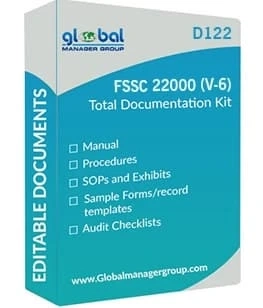Inside the food industry, where consumer health directly hinges on consistent quality and safety, robust systems are crucial. The ISO 22000 standard provides a globally recognized framework for establishing a Food Safety Management System (FSMS) that prioritizes prevention, control, and continuous improvement. At the heart of this system lies comprehensive documentation, playing a vital role in ensuring and enhancing food safety management.
The ISO 22000 standard itself doesn\'t specify formats or templates, offering flexibility for companies to adapt the documentation to their specific needs and operations. However, it outlines a four-tiered structure:
- Food Safety Policy: This high-level declaration sets the company\'s commitment to food safety and outlines its core principles.
- Food Safety Management System Manual: This comprehensive document acts as a roadmap, detailing the FSMS framework, its objectives, and how it complies with the standard.
- Procedures: These define specific steps and responsibilities for key processes like sanitation, allergen control, and recall procedures.
- Work Instructions and Records: These provide detailed guidance for routine tasks and document essential data collected throughout the food chain.
Ensuring Quality through Documentation:
Effective ISO 22000 documentation contributes to food safety quality in several crucial ways:
- Consistency and Standardization: Documented procedures ensure that everyone across the organization follows the same steps, minimizing the risk of human error and inconsistency. This creates a predictable and controlled environment for food handling and processing.
- Clear Responsibilities and Accountability: Procedures certainly define roles and responsibilities, making it easy to identify who is accountable for each step. This facilitates corrective action and fosters a culture of ownership for food safety.
- Improved Communication and Training: Comprehensive documentation serves as a valuable training tool for new and existing employees, ensuring everyone understands the importance of food safety protocols and their specific roles within them.
- Enhanced Traceability and Recordkeeping: Detailed records of processes, controls, and measurements allow for traceability throughout the food chain. This is crucial for identifying and containing potential problems quickly and effectively.
- Facilitation of Continuous Improvement: Regularly reviewing and updating documentation based on internal audits, risk assessments, and industry best practices allows companies to proactively identify areas for improvement and adapt their FSMS to evolving regulations and consumer demands.
Beyond Compliance: Achieving Excellence
While ISO 22000 certification demonstrates compliance with the standard, true quality in food safety management goes beyond ticking boxes. Effective documentation is a critical tool for continuous improvement, enabling companies to:
- Implement a risk-based approach: By documenting and analyzing potential hazards at each stage of the food chain, companies can tailor their controls to mitigate the most significant risk.
- Demonstrate transparency and build trust: Comprehensive and accessible documentation fosters transparency with consumers, regulatory bodies, and stakeholders, building trust in their commitment to food safety.
- Drive innovation and efficiency: The continuous improvement mindset recommended by effective documentation empowers employees to identify and implement innovative solutions to enhance food safety and operational efficiency.
Conclusion:
In the end, ISO 22000 documentation is a dynamic force that not only ensures compliance with regulatory standards but also elevates the quality of food safety management. From the meticulous crafting of the ISO 22000 manual to the best implementation of procedures, every aspect contributes to a culture of excellence. By embracing this comprehensive documentation framework, organization can fortify their commitment to delivering safe, high-quality food products, earning the trust of consumers and stakeholders alike. ISO 22000 documentation, including the manual and procedures, stands as a testament to an organization\'s dedication to continuous improvement and unwavering quality in the realm of food safety management.



